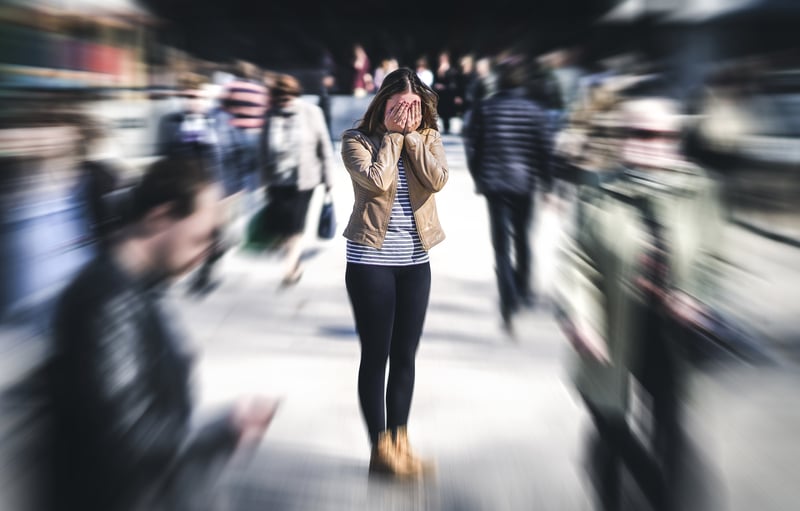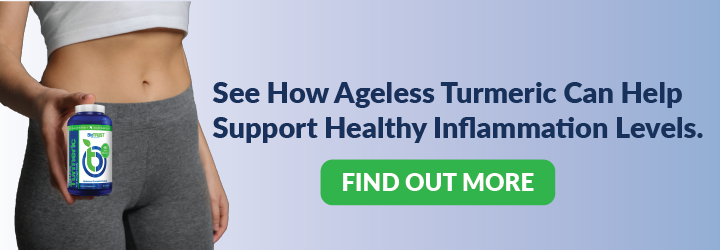What I Learned After Having My First Panic Attack

After some internal back and forth, I decided that since we are all friends here, and so many of you have shared things that allowed you to be vulnerable, I would take a moment and share a scary incident that occurred over the Memorial Day weekend.
Usually when I sit down at my computer to author content for my job, I do so with the intent to resonate with my readers, and I often find quotes or interject my own “deep thoughts” so folks can relate and hopefully appreciate my take-home point(s).
This will be a little different. I want to give everyone a wakeup call to take care of yourself FIRST. So many of us, myself included, put everyone and everything ahead of our own health and never give it a second thought. From our children to significant others, parents, neighbors, heck, even the PTA in some instances. For so many years, I have preached that you are not as valuable to others if you do not value your own safety and well-being FIRST.
Flashback to March 2019 when I posted about SELF-CARE. My post went a little something like this:
When you get on a plane and the flight attendants go over the safety instructions, they always tell you to put your oxygen mask on first before you help others.
Why? Because if you don’t get your mask on and you run out of oxygen, you wouldn’t be able to help anyone else.
Self-care is so important. I cannot stress it enough. One of the things I have learned over the years is not to take this for granted.
Burnout sneaks up on you and can be relentless. Practice self-care deliberately. Find creative ways to fit it into your day. People complain about not having enough time, but if you become burnt out, you are less productive.
Self-care doesn’t have to be something long or elaborate. It’s just a chance to recharge. I guarantee you make time to recharge your phone each night: Why should this be any different?
Back to the holiday weekend… I started to notice I was not feeling quite myself. Having been under a little more stress than usual, I chalked it up to just really needing to dial things back and enjoy a relaxing weekend. But did I? Of course not.
I had an endless “to-do list” of things I wanted to accomplish, which mainly included organizing, planting a garden, maybe hitting the beach, cleaning out the garage, etc. Notice how nothing in there sounds relaxing, and nothing was taking time out for ME?
Catch up on sleep, remember to take my supplements, exercise, practice good hygiene—THOSE were the things that should have been top on my list. But none of them were even on my list.
Now I know my mistake, but I had to learn the hard way.
My Personal Experience of a Panic Attack
As I was getting out of the shower and looking for something to put on for the day, I began to notice that it was increasingly difficult to catch my breath. I even went as far as to clutch my chest a few times because I just couldn’t figure out how to get more air. I began breathing in through my mouth and out through my nose, as Coach Tim has coached us to do so many times. Then I began to notice a tingly sensation in my arms which traveled quite rapidly down my legs.
I laid down on my bed hoping this would alleviate these symptoms, and I could slow my breathing enough to get it back to normal. This only made things worse. A million thoughts ran through my head—“What if this is a heart attack?”…“What if I died—who would take care of my children?”… “I’m all alone right now: who is going to call for help?”
I managed to pull myself up off the bed and made my way to my neighbor’s house as she just happens to be a nurse. Once I arrived, I was barely able to get the words out, “Please help me, I can’t breathe.”
She immediately began to assess my vitals. But just as she had me sit down, I realized my whole body was going numb, then it froze—I felt almost paralyzed. I jumped up and ran out of her house, only to collapse in the front yard. Both she and her husband immediately ran after me and came to my side. My legs felt paralyzed as they shot out in front of me and cramped worse than ever before. I could feel my hands clenching and couldn’t move my face, let alone my mouth, to talk. I just thought repeatedly, “I am going to die, and I don’t want to go out like this.”
Another neighbor came outside and everyone was dialing 911. All I heard was “the line is just ringing… they aren’t picking up.” I tried to cry, I tried to scream, but no sound was coming out. At this point, I couldn’t feel my legs or my arms, and I couldn’t even move them to assess anything.
After what seemed like an eternity, I heard sirens and saw flashing lights. Several men jumped out of the ambulance and looked like they were in slow motion as they approached me. They put me onto a stretcher and into the back of the ambulance and began hammering me with questions: “What is your name?”… “Do you know where you are?” I could barely utter words. They began to massage my extremities to make the muscles stop spazzing, and it felt like the worst pain ever. I kept trying to ask if I was having a heart attack and when it would stop.
They hooked me up to an IV and called a physician on their computer for a Telemed visit. The physician said that unless I could speak in complete sentences to him, they would not allow me to be treated in the ambulance, and I needed to be admitted to the hospital.
My blood pressure was through the roof; however, my EKG was showing that my heart was not damaged or experiencing any trauma.
The EMTs continued to surround me and work on getting my breathing under control and added some sedation medication to the IV. Then off we went to the emergency room.
The ride seemed to take forever even though it was less than five miles from my home. I was quickly admitted and was poked and prodded for bloodwork, finger (blood sugar) pricks, urine samples, along with being hooked up to monitors.
Every time they attached the blood pressure cuff to my arm, the tight squeeze sent my whole arm into a temporary paralysis, and then it traveled down my whole body. They proceeded to tell me to try to breathe slowly and focus on slowing it down as much as possible. I was able to do so for up to 10 minutes at a time, except when they hooked up the blood pressure cuff. Eventually we hooked it to my leg as that seemed to be less irritating and didn’t cause me to feel so much muscle tension.
Once the lab work came back in, I was informed that I was dangerously low in potassium, and based on all the other tests, this was not a heart attack but rather a severe panic attack. I couldn’t help but think of all the times I had casually joked that I was having a panic attack without comprehending what it indeed was. This is truthfully what I imagined a heart attack to feel like, so trust me when I say a panic attack is no laughing matter.
It took most of the weekend to get to where I felt comfortable being left alone or even left with my own thoughts. I am taking a long, hard look at my habits and reevaluating what should stay and what needs to be kicked to the curb. I am more aware and thankful than ever before of how precious life is and what is most important. And I want to remind all of you, and especially myself, that you need to put yourself FIRST.
What is a Panic Attack
According to the Mayo Clinic, “A panic attack is a sudden episode of intense fear that triggers severe physical reactions when there is no real danger or apparent cause. Panic attacks can be very frightening. When panic attacks occur, you might think you’re losing control, having a heart attack, or even dying.”
Fortunately for most of us, we may have one or perhaps two panic attacks throughout our lives. Once the trigger, problem, or stressful situation ends, so does the attack. Other people, however, may experience reoccurring unexpected panic attacks. This can lead to a near constant fear of another attack, which may cause a condition known as panic disorder.
And while panic attacks themselves aren’t actually life-threatening, they can feel that way. They’re very frightening and can significantly diminish quality of life. Luckily, known treatments have been shown to be quite helpful and effective.
What are the Symptoms of a Panic Attack?
Again from the Mayo Clinic, “Panic attacks typically begin suddenly, without warning. They can strike at any time—when you’re driving a car, at the mall, sound asleep, or in the middle of a business meeting. You may have occasional panic attacks, or they may occur frequently.”
Panic attacks come in different shapes and sizes, but one consistency is that the symptoms tend to hit a peak within minutes. After the panic attack subsides, you’ll likely feel tired and worn out.
Some signs or symptoms of typical panic attacks include:
- A feeling of impending doom
- Loss of control
- Fear of death
- Shortness of breath
- Rapid, pounding heart rate and chest pain
- Body sensations like trembling or shaking
- Numbness or tingling sensations
- Tightness in your throat
- Chills
- Hot flashes or sweating
- Nausea
- Abdominal or body cramping
- Headache
- Dizziness, lightheadedness, or faintness
- Feeling detached or out of touch with reality
Perhaps most bothersome is that many people experience an intense fear of another panic attack after they’ve had one. It could even prevent you from enjoying your life as you begin to avoid certain people, events, or situations for fear that they could trigger another attack.
What Causes a Panic Attack?
It’s not known what causes panic attacks or panic disorder, but again, according to the Mayo Clinic, factors that may play a role include:
- Genetics
- Intense stress
- Personal temperament (some people are a bit more sensitive to stress or may experience more negative emotions)
- Changes in brain function
While many panic attacks come on suddenly, with little to no warning, if they continue to happen, many people notice a connection to situations or events. Research indicates that the body’s natural fight-or-flight response is typically involved. For example, if a mountain lion was stalking you, your body would react instinctively. The body would prepare for the life-threatening situation by increasing heart and breathing rate. Many of the same stress reactions are triggered during a panic attack. But it’s unknown why a panic attack occurs when the danger isn’t so obvious.
How Can You Avoid or Minimize Your Panic Attack Risk?
Unfortunately, there’s no guaranteed method to prevent all panic attacks. However, these tips may help:
- Get help or treatment for the panic attack as soon as possible. This can help bring it to an end, prevent it from getting worse, or help prevent more frequent attacks.
- Stick with the plan from your doctor or other health-care practitioner. This may help prevent relapses or allowing panic attack symptoms to get worse.
- Get regular physical activity, which may help reduce general feelings of stress and anxiety.
- Practice quality self-care and listen to your body. Don’t ignore the signs your body gives you by pushing through stress and anxiety. It’s okay to put yourself FIRST. In fact, it’s necessary.




 7 Signs Your Body is Seriously Low on Collagen (not just wrinkles)
7 Signs Your Body is Seriously Low on Collagen (not just wrinkles) Health Expert: "Turmeric Doesn't Work (unless...)"
Health Expert: "Turmeric Doesn't Work (unless...)" 3 Warning Signs Your Probiotic Supplement is a Total Waste
3 Warning Signs Your Probiotic Supplement is a Total Waste

